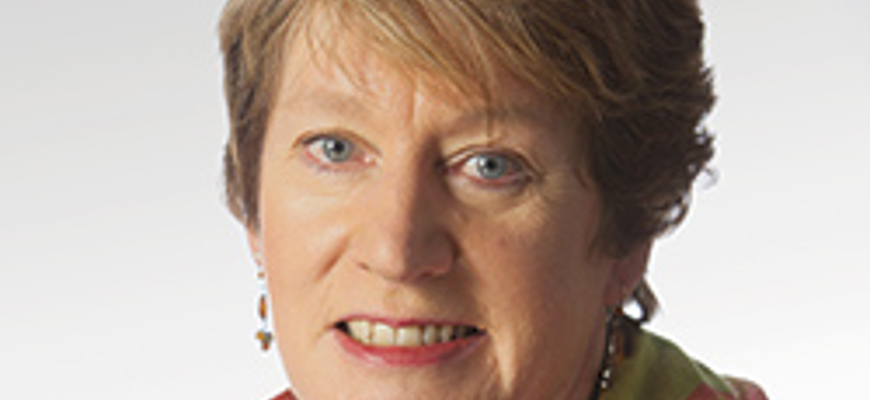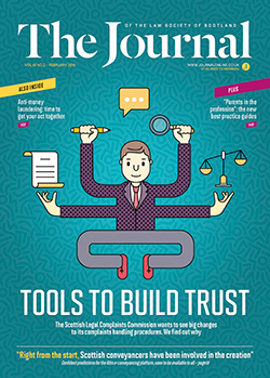Charged and ready

Catherine Dyer CBE is Crown Agent for Scotland and chief executive of the Crown Office & Procurator Fiscal Service. Appointed in 2010 and the first woman to hold the post, she is also Queen’s & Lord Treasurer’s Remembrancer for Scotland and Diversity Champion for the Scottish Government.
Where do you come from, and what was your career path?
The west end of Glasgow, with no prior connection to law. I enjoyed history, English and debating, but decided not to go into politics as suggested by a career adviser! I graduated LLB with Honours in forensic medicine, and obtained my Diploma, from the University of Glasgow. I trained with the late Gerry Carroll, who was a tremendous boss. He gave me a lot of latitude, taught me not to assume, to question afresh every aspect of each case, and to tell him if I made a mistake – but only after I had worked out the solution. As well as private practice in Cambuslang, I have worked in Kilmarnock, Glasgow, Hamilton, Linlithgow and Edinburgh for COPFS.
How is your in-house legal team structured, how do you organise your overall strategy and governance, and do you take on trainees?
COPFS is the sole prosecution authority in Scotland. I am principal legal adviser on prosecution matters to the Law Officers of Scotland, the Lord Advocate and Solicitor General. As civil service head of COPFS, I am Head of Profession and Accountable Officer, responsible for delivering all of our business and appropriate spending of our budget.
The Law Officers sit on our strategic board and set prosecution policy. Executive board, which I chair, sets strategy for COPFS to deliver the Law Officers’ priorities.
Crime demographics have changed dramatically in recent decades, and, as in private practice, we have had to specialise. Specialisms have emerged due to legislation or societal change. Our current teams include those working on recovery of civil and criminal proceeds of crime, international evidence gathering and extradition, sexual, domestic abuse and hate crime, wildlife and environment crime, and health and safety cases. We also investigate all deaths that require further explanation, instruct pathologists and attend at post mortem examinations.
A career in COPFS starts with learning the job and developing requisite legal and people skills. Staff on the promotional path incorporate management of people, budget, and risk. As one of the largest public sector employers of solicitors in Scotland (more than 500), we take on 20 trainees each year and offer a very well-regarded traineeship, with our own PEAT and advocacy training, and every six months second one trainee to Eurojust at The Hague.
What is a typical working day?
Each day is different, depending on what sensitive and high-profile cases are coming up. I usually have a mixture of internal and external meetings, deal with lots of emails and go out and about to our offices and staff. In addition to daily contact with the Law Officers, I meet regularly with the Lord Justice Clerk, sheriffs principal, the Scottish Government Justice Directorate and other organisations such as Victim Support. I engage with members of the public and community groups, to explain what we do. While constitutionally independent, we always have to reflect on our impact on others and listen to their views.
What motivates you on a Monday morning?
People. I have tremendous colleagues who go the extra mile and really understand that we make a difference to individuals and communities across Scotland. Our staff enjoy dealing with “real life” law. In addition to our Scottish Prosecution College, where we develop and deliver much of our staff training, we have a COPFS intranet and knowledge bank. These online portals provide easy access for all staff to our prosecution policies, corporate expertise and legal authorities, as well as HR and staff welfare information.
What was the biggest change for you when you moved in-house, and what do you really enjoy about working in-house?
The constant learning point has been how little the public and, perhaps more surprisingly, the profession, know about the work of a prosecutor. It is very useful to have dealt with public sector delivery and accounting requirements as well as legally aided and private clients, and to have had civil experience as well as criminal. The unique dynamic is that no one chooses to interact with a prosecutor, whether as a victim, witness or accused. COPFS has to represent the public interest while upholding individuals’ legal and human rights, but also has obligations to maximise quality and value for public money.
While there are many business parallels, public service attracts different perceptions. Many folk do not realise that we are a large national business that has achieved a lot of really good things, delivering much improved outcomes and quality casework against reducing budgets.
I very much value the different aspects of business delivery and legal decision making that emerge every day. We achieve the best outcomes as part of a team, both within our own organisation and through dedication to teamwork with our external partners and stakeholders. While we recognise the need for adversarial approaches at points in the process, we all have to work together as we interact across the criminal justice system.
Has your organisation experienced any major change recently?
There is now much more serious sexual and domestic abuse offending reported, which has an effect on all involved. The evolution of fiscal fines and compensation orders, for offences which can be dealt with by direct measure rather than court disposal, means that the justice system as a whole can concentrate on what needs to go to court. The IT systems we adopted to improve workflow and join us up with the police and courts in the early 80s have proved invaluable. We play an active part in Justice Board work to improve these. Our own technology initiatives include our secure disclosure website, which allows defence solicitors to download copies of Crown witness statements and productions, and we are just about to roll out iPads for use by prosecutors in court in place of paper files.
It is a really exciting time for technology in our courts. There is already the facility to take evidence on oath via video link, and I think the next major change will be the move away from written witness statements to capture of “best evidence” recordings, to allow the court to see a witness at the scene and hear what they said to the police.
What was your most amusing work experience?
During a sheep-worrying trial in Kilmarnock Sheriff Court, a local defence agent tried, inventively but unsuccessfully, to lodge a special defence for the dog!
What makes a good in-house lawyer, and what’s your career advice for young lawyers
who want to move in-house?
Be clear about what you are trying to deliver, be innovative and think of ways to improve things constantly. Become totally competent at what you do, think about the bigger picture, pay attention to what is happening in the world and incorporate some of that wider knowledge to help your organisation to deliver and keep ahead of change. Never refuse a new work experience opportunity. Each one is a chance to develop. The law is living and dynamic. Think about how best to communicate and always be courageous in your advice.
What are the current hot legal topics in your sector? How does the future look for in-house lawyers?
Use of digital technology to present evidence in court will change how cases are prepared and conducted.
Further consideration of the corroboration requirement is still on the agenda, to follow jury research. We are in a century of significant, quick-paced change with no let-up in sight and will continue to develop potential to improve even further, both in terms of public expectation and our own appetite for improvement.
We are experts who know our areas of business deeply and benefit from huge diversity of workload, which allows us to develop and grow, resulting in very satisfying and fulfilling individual careers.
Do you seek external legal advice?
We seek specialist legal advice on employment law and contracts through Scottish Government Legal Directorate. For very specialist areas, we take expert opinion from a solicitor advocate or counsel, but on the whole, high expertise and competence around public prosecution lies within COPFS.
Does Scottish legal education and training provide the necessary skills for working in-house in your organisation?
Yes, it is fantastic and of high quality. It may be that, at times, individuals can be slow to react to change, but all solicitors are increasingly aware of this need.
The whole profession needs to think more about the psychology of dealing with customers/clients, look hard at how we interact, how our advice is received and understood. Adversarial approaches should be restricted to appropriate parts of court proceedings and not the default position.
How do you think in-house lawyers today are perceived within the legal profession?
Still a mystery to some, but perception has improved a lot. There are now so many career paths for solicitors that we need to consider whether these can still be brigaded as simply “private practice” or “in-house”.
How do you see the current remit of the In-house Lawyers’ Committee developing?
Much of what COPFS does could be applicable elsewhere, and what others are doing could be imported by us. As budgets get tighter, more efficiency is required – a great opportunity for in-house lawyers across the public and private sectors to collaborate.
What keeps you busy outside the office?
Family, friends and reading – work/life balance is crucial.
What would you take with you to a desert island? What would you put in Room 101?
Take Classic FM; dump cynicism in Room 101.
What have been the recent highlights of your office as Queen’s & Lord Treasurer’s Remembrancer?
Fantastic Iron Age gold torcs from Blair Drummond (now in the National Museum of Scotland), and last year’s Galloway hoard of stunning Viking jewellery, pottery and cloth. Expert volunteers on the Scottish Archaeological Finds Allocation Panel advise me as to which museum should be allocated items. Our annual report was recently published.
In this issue
- A trainee perspective on leadership
- Beyond the Bribery Act
- Legal IT: the potential of blockchains
- Directors: the parent over your shoulder
- Ten for starters
- Reading for pleasure
- Journal magazine index 2015
- Opinion: Daniel Donaldson
- Book reviews
- Profile
- President's column
- The big 4-0-0 approaches
- People on the move
- Balance in redress
- Pension allowances: the last chance
- E-conveyancing: the real deal
- Deeds of conditions: not dead yet
- Anti-money laundering: a call to action
- New challenges, new CEO
- Rape terms before the appeal court
- Another year of change
- Defending the abduction
- The right to snoop?
- Fond farewell
- Scottish Solicitors Discipline Tribunal
- Dilapidations: enforcing the bargain
- Title out of nothing
- Charged and ready
- Updates from the OPG
- The family way
- Conflict of interest: the questions still come
- Seeking growth
- Fraud: a battle of wits
- Light to a Safe Harbour
- Through the client's eyes
- Ask Ash
- Law reform roundup






